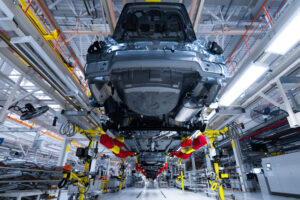
Global study finds automotive OEMs are using AI to overcome employee recruitment and retention issues
By onInternational | Market Trends
A global study, based on responses from 130 automotive and tire manufacturers, OEMs, engineering procurement companies, and systems integrators, has found a tendency to lean into AI use and upskilling to overcome workforce and operational challenges.
Rockwell Automation, Inc., an industrial automation and digital transformation company, shared the results in its 10th annual “State of Smart Manufacturing Report: Automotive Edition.” Responses were gathered from 15 countries.
Workforce pressures are now the most urgent challenge for automotive companies.
“Inflation, economic growth, and workforce concerns are the primary external barriers to growth for automotive manufacturers, followed by consumer and regulatory requirements,” Rockwell wrote in the study. “Overcoming workforce pressures, driven by retiring expertise and the demand for new data science skillsets, will be key to helping automotive and tire manufacturers outpace competition and effectively deploy new technologies for long-term business impact.”
Automotive and tire manufacturers predict that their top workforce-related challenge over the next year will be change management (37%), ensuring employees and departments effectively adopt new technology and processes.
Employee retention (33%), the rising cost of skilled workers (36%), and difficulty finding new employees (31%) were also listed as top concerns.
The concerns aren’t far from what collision repair shops have voiced in their search for new technicians amid the ongoing nationwide shortage, and are key in retention as well by offering competitive pay and benefits, training, and a healthy shop culture.
TechForce Foundation’s latest Technician Supply & Demand report found that student graduations in all automotive segments increased in 2022 — more than 5% in collision repair — while filling a shortage of instructors is thought to be one way to pull more students in.
Although 4,725 graduates in 2022 were higher than the 4,487 that graduated in 2021, the difference compared to 2013 was still 45% lower, according to TechForce.
According to Rockwell’s study, to fill the projected 7.9 million manufacturing worker gap by 2030, manufacturers are not only investing in automation but also seeking more workers with AI experience and soft skills, such as communication, adaptability, and analytical thinking. Eighty-four percent of respondents said the top three skills they look for when recruiting from the next generation of workers are analytical thinking, communication, and teamwork.
“The sector is prioritizing strategies to retain, upskill, and support the workforce to drive stronger business outcomes,” the study states. “Technologies that enhance human contributions, such as smart manufacturing tools, AI, and automation, paired with expanded employee training and formal change management programs, are seen as key to navigating the road ahead.”
The study found that the automotive industry now views the rise of AI as less of a risk compared to 2023, down to 14% from 24%. The top three uses respondents said they have in mind for AI over the next year are quality control, robotics, and process optimization. Cybersecurity and logistics are also considerations.
Compared to those in other sectors, automotive companies are leading planned generative AI investment, robotic process automation (RPA), and digital tools.
Automotive and tire manufacturers continue to invest in AI, production monitoring, and cybersecurity. Thirty-two percent report deploying and integrating new technology as the biggest internal obstacle to growth. More than 62% of respondents cited long-term business impact as the primary driver of technology investment, followed by expansion or increased capacity (58%).
The top goals of tech adoption remain consistent — to improve quality, reduce costs, and lower risks related to safety, cybersecurity, and compliance.
Compared to last year, cybersecurity concerns have declined. Rockwell says this suggests many manufacturers have made progress in securing their digital environments.
“The future of automotive manufacturing hinges on transformation — not just of technology but talent,” said James Glasson, Rockwell Automation global industry vice president, in a press release. “As AI and automation reshape the factory floor, success belongs to those who are investing in people. Upskilling and innovation are now the driving forces behind growth.”
Audi recently announced that it has increased its use of AI in its vehicle production lines to improve efficiency and quality, according to a press release from the OEM.
“The aim is to fully exploit the potential of AI and data – both in company processes and in the customer experience with services and products,” the release states. “AI is currently making the biggest impact in the areas of production and logistics.”
Audi currently operates more than 100 AI projects in various stages of development at its production facilities, which the company is gradually integrating into series production processes and expanding. For now, the primary focus is on AI-supported quality monitoring and generative AI.
In March, Volvo Cars shared that it can synthesize incident data collected by the advanced sensors in its new models, such as emergency braking, sharp steering, or manual intervention, to create “even safer” vehicles.
Volvo uses AI-generated life-like virtual worlds to enhance the development of its safety software, and with data collected, can “probe, reconstruct, and explore” to better understand how incidents can be avoided, according to a press release from the OEM.
Around the same time, GM announced an expanded collaboration with NVIDIA to develop next-generation vehicles, factories, and robotics using AI simulation and accelerated computing.
Images
Featured image credit: Traimak_Ivan/iStock
